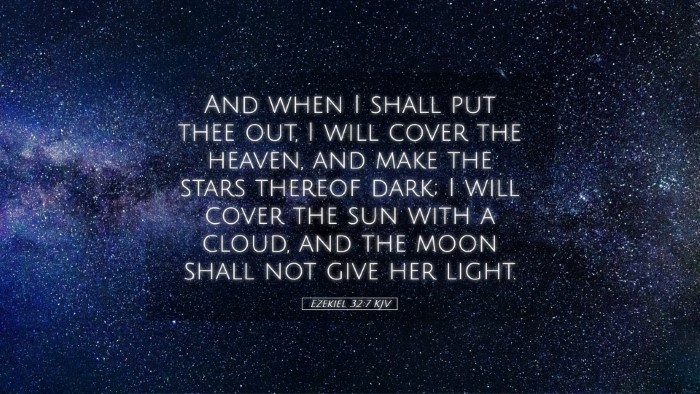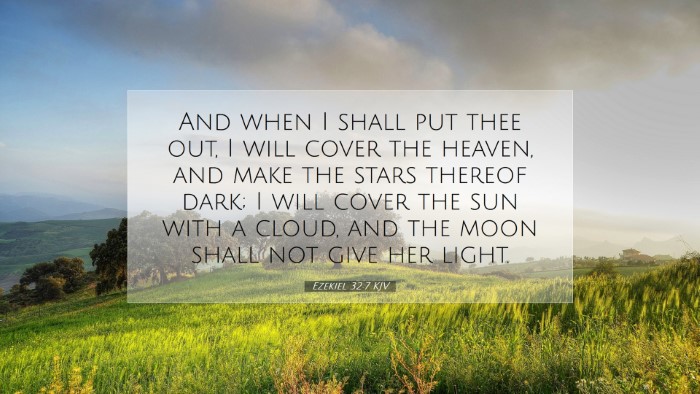Ezekiel 32:7 - Commentary Overview
Verse: "And when I shall put thee out, I will cover the heaven, and make the stars thereof dark; I will cover the sun with a cloud, and the moon shall not give her light."
This verse, drawn from Ezekiel's profound prophetic narrative, presents a moment of divine judgment intertwined with cosmic imagery. It underscores the gravity of God's pronouncements against nations, specifically addressing the fate of Egypt as a once-mighty power.
Contextual Understanding
Understanding Ezekiel 32:7 necessitates a grasp of its larger narrative context within the Book of Ezekiel. This book is replete with prophetic oracles that address not only Israel but also the surrounding nations, particularly at the height of their arrogance against God.
Historical Context
After the fall of Jerusalem, Ezekiel prophesied extensively about the surrounding nations. Egypt, often a symbol of oppression and idolatry, is highlighted for its ultimate fate due to its pride and self-reliance. The backdrop of this chapter is the impending doom faced by Egypt, with the vivid imagery mirroring the prophetic tradition that invokes celestial phenomena to convey divine displeasure.
Thematic Insights
The themes within this verse reveal profound theological implications. The imagery of darkness characterizes God's judgment, signifying a withdrawal of His favor and presence.
The Divine Withdrawal
According to Matthew Henry's Commentary, the act of God covering the heavens indicates a severance of divine approval and an impending state of gloom. Henry notes that this withdrawal is not merely physical darkness but represents the loss of hope and guidance that the heavens provide.
The Cosmic Imagery
Albert Barnes expands on this cosmic imagery, reflecting on how darkening the sun and stars illustrates a complete reversal of order. It symbolizes the chaos that ensues when nations abandon their reliance on God, thus revealing the futility of human pride.
Spiritual Implications
The verse not only serves as a historical pronouncement but also invites spiritual reflection for believers. Theologians, such as Adam Clarke, emphasize that the imagery should remind readers of the spiritual darkness that envelops hearts when they turn from God's counsel.
Warning Against Pride
Clarke highlights that Egypt's pride is emblematic of any nation or individual who defies divine authority. The text stands as a stark warning: without acknowledgment of God, darkness, despair, and judgment become inevitable.
The Hope of Restoration
Yet, embedded within this judgment is the hope for restoration that permeates the overall narrative of Ezekiel. The denunciation of Egypt ultimately points to the greater narrative of God's sovereignty where judgment serves as a precursor to redemption.
Relevance for Today
In contemporary application, this verse poses critical questions about reliance on human systems versus divine dependence. Pastors can draw from this text to encourage congregants to scrutinize their allegiances, ensuring they do not place their trust in earthly powers that may ultimately lead to spiritual darkness.
Reflection and Application
- Divine Authority: Acknowledge God's control over nations and individuals, fostering humility.
- Personal Accountability: Reflect on personal and corporate behaviors that may lead to spiritual darkness.
- Hope in Judgement: Recognize the balance of God’s judgment with the promise of eventual restoration through grace.
Conclusion
Ezekiel 32:7 serves as a poignant reminder of the consequences of arrogance and the inevitable darkness that follows when one turns away from God. For pastors, students, and scholars, the layered meanings of this verse warrant exploration into their own lives and communities, prompting a return to sincere faith grounded in the enduring truths of scripture.


